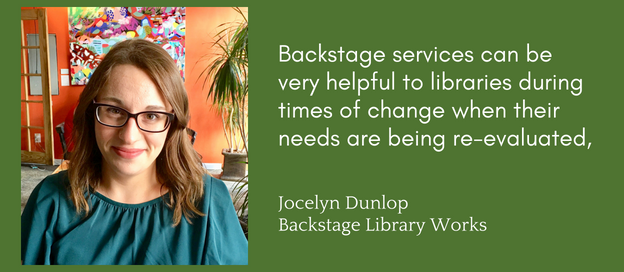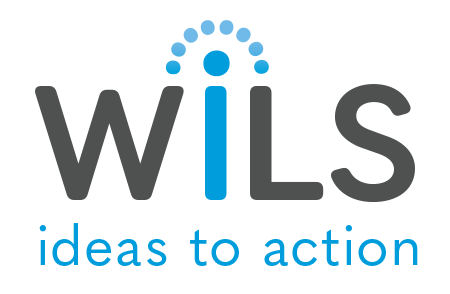
At WiLS, we want to bring valuable information to our library partners, including information about the missions and big ideas of the vendors they may already do business with. WiLS interviews a vendor partner in order to bridge the gap and open the door to valuable collaborations. This month, we are delighted to share insights from Jocelyn Dunlop, Account Representative at Backstage Library Works.
Tell us about your company’s background.
Backstage originally started in 1986 as a retrospective conversion outfit converting card catalogs into MARC records before we developed a fuller range of library services, including cataloging, authority control, digitization, and preservation microfilm services. We think of ourselves as a well-rounded access & preservation company, which truly dates back to our work in the 1980s and 1990s. Now we have two offices in the States and many on-site projects each year at libraries internationally.
Why do you, personally, choose to work with libraries?
I have always loved the mission of preserving history and supporting local community, which drove me to complete my Master’s in Library and Information Science before joining Backstage. I love to see the unique ways each library develops its collections and shares its resources, realizing that one solution does not fit all. I’m looking forward to continuing in this field as our definition of a community evolves and as preservation methods change to become more data-oriented and cloud-based. The best part of my job is the fact that I am able to visit so many libraries in the Midwest & Mountain Plains throughout the year, seeing their new approaches to common problems and which technologies are preferred by certain groups.
What do you like to know about the libraries you work with? What helps you better understand their needs?
I like to know what types of projects and initiatives libraries are working on. For example, is there is a big anniversary coming up? Are they adopting a new ILS? Did they just acquire a new collection? Are they migrating from one Digital Assessment Management System to another? What do they think of the latest RDA toolkit? Are they weeding in anticipation of a big renovation? Backstage services can be very helpful to libraries during times of change when their needs are being re-evaluated
What big ideas are being worked on at your company? What problems are being solved?
Backstage develops new solutions on a regular basis, depending on the needs of the library partners requesting our assistance. Currently, we are responding to major trends we are seeing in libraries: consolidation of physical collections, BIBFRAME development, legacy data clean-up, changes in digitization priorities, and staffing changes.
- We have noticed many libraries are moving physical collections off-site, re-organizing their space, and coordinating collection & acquisition amongst consortia members. For Backstage, this has meant an increased need for preservation microfilm to free up space in archival collections; it has also translated to more on-site projects where we are assisting with weeding; finally, we’ve had at least one library discover a cataloging backlog in a recently closed library building.
- One of the biggest ideas we have been working on in the last few years is BIBFRAME conversion and inserting linked data into library catalogs. We stay up to date on its developments and have updated our automated programs to accommodate URIs in MARC, which some of our authority control clients utilize.
- Beyond authority control, our automated services department has seen an increase in custom clean-up projects to upgrade brief records, de-duplicate collections in MARC or other formats like EAD, insert missing MARC fields, or convert data from one schema to another. We’ve had to adapt our programs for a new set of challenges.
- Until recently, most of our digitization work focused on print materials, but now libraries are delving into unique collections with a variety of objects, slides, microfilm, microfiche, oversize maps, and other unique items that have to be outsourced to experts. Our digitization department specializes in archival-quality preservation, adhering strictly to FADGI guidelines and having extensive training for special handling of fragile materials. We’ve also noted a change in mentality about mass digitization towards a more thoughtful, curated approach, meaning that smaller projects have much more meaning to the patrons.
- We have seen staffing roles re-defined in libraries, meaning that our services must fill in the gaps where there were none before. More and more cataloging librarians are taking on programming responsibilities with less time for the manual work, which is where Backstage can step in to help with original cataloging. When dealing with higher volume preservation projects, the high capacity we have in our digitization and microfilm departments also makes outsourcing a project significantly faster than doing it in-house.
How can librarians become partners in product or training development?
We welcome librarians with new ideas to seek our help in creating a solution at info@bslw.com. Even if it is a service we don’t already provide, we may have the in-house expertise to develop it. We have a wealth of resources in our imaging, photographic, cataloging, and programming staff so it never hurts to ask.
This interview is part of a series of interviews with both WiLS library and vendor partners. Your feedback is appreciated. If you have any to offer on this article or suggestions for upcoming interviews, contact Andrea Coffin at acoffin@wils.org.
